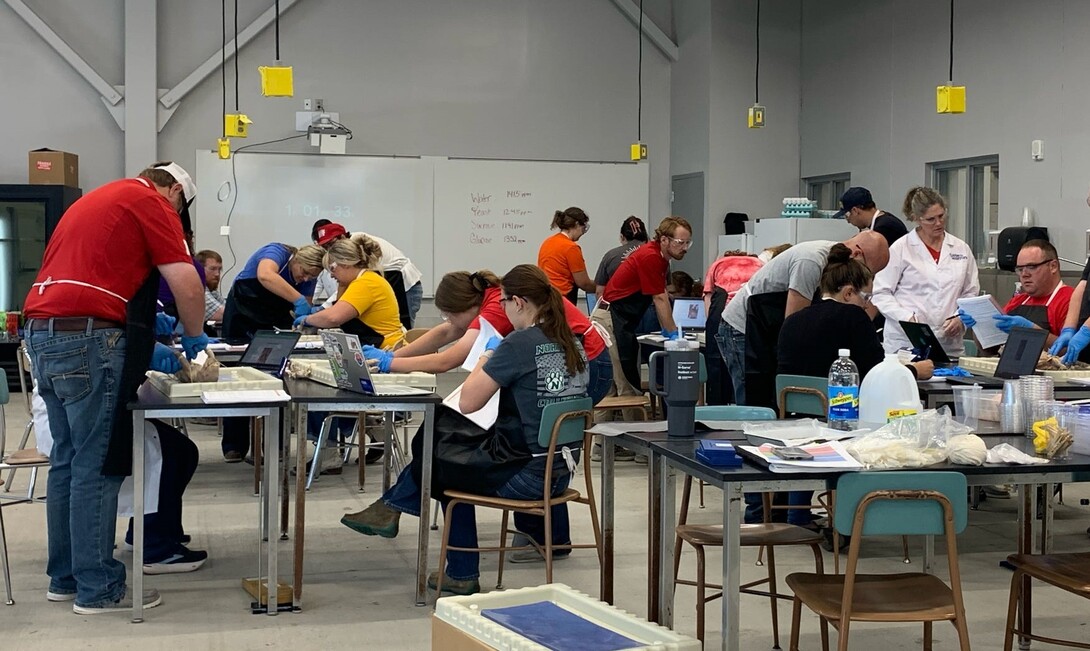
Lincoln, Neb. —Sometimes a helpful way to support Nebraska ag teachers is to treat them like a student. That’s been the theme since 2011 as agricultural educators participate in intensive summertime training sessions sponsored by the University of Nebraska–Lincoln’s Department of Agricultural Leadership, Education and Communication.
This year’s sessions, held June 18-20 at Lakeview High School in Columbus, focused on animal science and used the national Curriculum for Agricultural Science Education (CASE) program. Twenty-one ag instructors from Nebraska and five other states (Iowa, Kansas, Colorado, Arkansas and California) participated in about 40 hours of workshop instruction and activities.
“These professional development workshops allow teachers to gain hands-on experience, network with other teachers and feel empowered before entering their classrooms in the fall,” said Monty Larsen, an ALEC faculty lecturer who provides outreach support for Nebraska agricultural and skilled technical science educators.
One lab involved study of livestock biology through reproductive tract dissections of beef, sheep and swine. In another lab, teachers created and used a calorimeter that calculated the energy level of various feedstuffs. In still another, educators studied and discussed pedigree data on the occurrence of physical traits from one generation to the next.
Above: Two agricultural educators discuss pedigree data on the occurrence of physical traits from one livestock generation to the next. CASE Institute workshops, held each summer and sponsored by UNL's Department of Agriculture, Education, Leadership and Communication, encourage and facilitate collaborations among the workshop participants. Monty Larsen | Agricultural Leadership, Education and Communication Department
All materials and activities in the CASE Institute workshops are classroom-ready, to give the teachers a student perspective and promote educators’ classroom effectiveness in approaching the subjects.
Teachers each summer praise how the workshops facilitate networking among ag educators. “Participants develop a strong sense of community by going through the entire curriculum, much like students in their own classrooms,” Larsen said. “This provides a network of colleagues who can offer suggestions or even provide support as they teach the curriculum.”
ALEC has hosted CASE sessions each summer in Nebraska since 2011, with the exception of the COVID years of 2020-21. CASE training focuses each year on a different ag-education subject. Topics include animal science, plant science, environmental science issues, ag equipment maintenance and technology, and agricultural research and development.
“I can think of no other professional development which focuses on building community within the participants from the first day,” Larsen said. “Participants frequently can network with each other either individually or in a small group setting. This is imperative for building a circle of mentors for young teachers who are entering a very high demand, yet demanding, career.”
The demographics for the CASE training are similar to those for agricultural educators in Nebraska and nationwide. More than 50% of the workshop participants have less than five years’ experience.
“So, younger teachers understand the benefit of having valuable curriculum, which is engaging, inquiry-based, with a focus on STEM and careers,” Larsen said. “But these professional development opportunities aren’t just for young or inexperienced teachers. There were several teachers with over 10 years of experience using this professional development to hone their craft and fortify teaching strategies as well as curriculum.”
The ALEC Department, Larsen said, “is committed to developing a strong professional relationship with each agricultural educator in our state to maintain a high level of great agricultural educators through outreach and support of their faculty and staff.”







